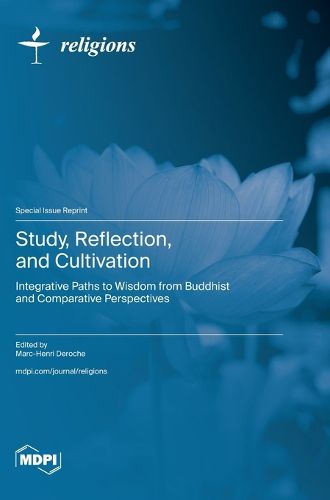Readings Newsletter
Become a Readings Member to make your shopping experience even easier.
Sign in or sign up for free!
You’re not far away from qualifying for FREE standard shipping within Australia
You’ve qualified for FREE standard shipping within Australia
The cart is loading…






This title is printed to order. This book may have been self-published. If so, we cannot guarantee the quality of the content. In the main most books will have gone through the editing process however some may not. We therefore suggest that you be aware of this before ordering this book. If in doubt check either the author or publisher’s details as we are unable to accept any returns unless they are faulty. Please contact us if you have any questions.
This special issue elucidates the articulation between discourse and experience within the development of wisdom, mainly in Buddhism, both in dialog with the West and for teaching mindfulness in contemporary education. Wisdom, as the "right view," represents the eye or guiding principle of the path that was taught by the Buddha according to three progressive stages: (1) the "wisdom born from study"; (2) the "wisdom born from reflection"; and (3) the "wisdom born from cultivation." Two articles explore this model in Indian Buddhism and its relationship with mindfulness, as well as in the later debates with Advaita Vedanta regarding truth and self-transformation. Three articles investigate this model further from Asa?ga and Vasubandhu in India to Xuanzang in China, and then as an educational paradigm in the Japanese school of Tendai according to Saicho, or as a heuristic device to approach mindfulness in the Zen philosophy of Dogen. The next three articles focus on Tibetan Buddhism, considering meditation manuals as facilitating the transition from scholarship to practice and discussing mindfulness in the progressive path of wisdom versus the sudden insight of Dzogchen and how the threefold wisdom model is central to the contemporary revival of Buddhism in Eastern Tibet. The last three articles examine the threefold wisdom model in terms of its larger methodological relevance for Buddhist studies and for facilitating dialog with other disciplines. Following the inspiration of Pierre Hadot, the model is compared with early Greco-Latin philosophy and ultimately applied to secular mindfulness-based programs in educational contexts.
$9.00 standard shipping within Australia
FREE standard shipping within Australia for orders over $100.00
Express & International shipping calculated at checkout
Stock availability can be subject to change without notice. We recommend calling the shop or contacting our online team to check availability of low stock items. Please see our Shopping Online page for more details.
This title is printed to order. This book may have been self-published. If so, we cannot guarantee the quality of the content. In the main most books will have gone through the editing process however some may not. We therefore suggest that you be aware of this before ordering this book. If in doubt check either the author or publisher’s details as we are unable to accept any returns unless they are faulty. Please contact us if you have any questions.
This special issue elucidates the articulation between discourse and experience within the development of wisdom, mainly in Buddhism, both in dialog with the West and for teaching mindfulness in contemporary education. Wisdom, as the "right view," represents the eye or guiding principle of the path that was taught by the Buddha according to three progressive stages: (1) the "wisdom born from study"; (2) the "wisdom born from reflection"; and (3) the "wisdom born from cultivation." Two articles explore this model in Indian Buddhism and its relationship with mindfulness, as well as in the later debates with Advaita Vedanta regarding truth and self-transformation. Three articles investigate this model further from Asa?ga and Vasubandhu in India to Xuanzang in China, and then as an educational paradigm in the Japanese school of Tendai according to Saicho, or as a heuristic device to approach mindfulness in the Zen philosophy of Dogen. The next three articles focus on Tibetan Buddhism, considering meditation manuals as facilitating the transition from scholarship to practice and discussing mindfulness in the progressive path of wisdom versus the sudden insight of Dzogchen and how the threefold wisdom model is central to the contemporary revival of Buddhism in Eastern Tibet. The last three articles examine the threefold wisdom model in terms of its larger methodological relevance for Buddhist studies and for facilitating dialog with other disciplines. Following the inspiration of Pierre Hadot, the model is compared with early Greco-Latin philosophy and ultimately applied to secular mindfulness-based programs in educational contexts.